Introduction: Balkampet Yellamma Temple, nestled in the heart of Hyderabad, is a place of divine spirituality and cultural significance. While it is renowned for its grandeur and devotion, intriguing secrets are hidden within its sacred walls.
In this article, we will delve into the depths of this ancient temple and uncover seven captivating secrets that make it is a truly unique and mystical place of worship.
Unveiling the Mysteries: 7 Secrets of Balkampet Yellamma Temple
The Enigmatic Idol: At the heart of Balkampet Yellamma Temple lies a fascinating idol of the presiding deity, Goddess Yellamma. What sets this idol apart is its mysterious origin. Legend has it that the idol was self-manifested, emerging from the ground without human intervention. This divine occurrence has captivated devotees for centuries, adding to the temple’s aura of spiritual significance.
The Hidden Underground Caves: An intricate network of underground caves lies beneath the temple complex. These caves are believed to be ancient pathways leading to neighbouring sacred sites. For those seeking to discover more about the enigmatic past of the temple, the fact that numerous caves have yet to be explored increases the sense of mystery and adventure.
The Whispering Walls: Another intriguing secret of Balkampet Yellamma Temple lies within its walls. It is said that the temple’s architecture has been designed so that whispers and soft sounds made near certain pillars or corners can be heard clearly in specific areas. This unique acoustic phenomenon leaves visitors awe-inspired and reinforces the divine energy that permeates the temple.
The Miraculous Water Source: An underground water supply is one of the temple’s lesser-known secrets. Despite the temple being in a bustling urban area, it is said that the water for the daily rituals and ablutions of the deity is sourced from a natural spring within the temple premises. The purity and sanctity of this water are believed to possess healing properties, attracting devotees from far and wide.
The Sacred Naga Pillar: A remarkable pillar dedicated to Naga, the serpent deity, is within the temple complex. Devotees often seek blessings by circumambulating the pillar, believing it grants protection from evil forces and brings good fortune. The intricate carvings on the pillar depict the mythical serpent with great artistic finesse, making it a captivating sight for visitors.
The Illuminated Nights: One of the fascinating aspects of Balkampet Yellamma Temple is its illumination during select nights of the year. The temple and its environs are illuminated brilliantly during festivals and other occasions, creating a spellbinding scene. This visual extravaganza attracts scores of devotees and tourists, creating a magical ambience.
The Eternal Flame: Generations have passed while an eternal flame has burned within the temple’s sanctum. This sacred flame symbolizes the eternal presence of the divine and is considered an embodiment of Goddess Yellamma’s energy. Devotees offer their prayers and seek blessings from this radiant flame, finding solace and spiritual guidance in its perpetual glow.
Balkampet Yellamma Temple Story
The Renuka Yellamma Story starts when Renuka, daughter of a king, was married to a sage named Jamadagni, whose mother was Satyawati. One of the five sons born to the marriage was Parushurama.
One day, Sage Jamadagni angered his wife for not performing daily household work. He told her to leave the house, then saddened, Renuka left, met the sages, and requested their advice. They advised her to pray to Lord Shiva and feed some Brahmins. Meanwhile, Jamadagni’s anger did not stop; he took further steps, called all his five sons, and asked them to kill their mother.
In disobedience of their father’s command, four have refused to kill their mother. Still, only Parushuramudu obeyed his father’s order, and then Jamadagni gave Parushuramudu one more order: to kill his brothers and his mother. Accepting his father’s order, Parushuramudu beheaded all his four brothers and mother, and he beheaded one more woman who came to protect Renuka. After the assassination, Parusuramudu went to his father Jamadagni; Then; his father granted him a boon. Then Parushuramudu asked to provide life to all the people he had killed.
Renuka’s face was transferred onto the other woman’s body, who had come to defend her during this process. Then Jamadagni accepted the woman with Renuka’s body, and the other women turned into Yellamma Thalli. She will be prayed for by the Telangana people with due respect. is the story of Sri Renuka Yellamma Thalli.
Unveiling the Enchanting History of Balkampet Yellamma Temple
Here we will delve into this revered temple’s origins, legends, and notable features, allowing you to explore the timeless charm and spiritual aura of Balkampet Yellamma Temple.
The Origins and Sacred Legend: Balkampet Yellamma Temple traces its roots back to ancient times, with its inception shrouded in myth and legend. According to local folklore, the temple was established by sage Agastya, a revered sage in Hindu mythology. The temple is dedicated to Yellamma, a manifestation of the divine Mother Goddess. It is believed that Yellamma appeared in a dream to a devotee, urging him to build a temple in her honour, thus giving birth to Balkampet Yellamma Temple.
Architectural Splendor: The architectural splendour of Balkampet Yellamma Temple is a testament to the artistic finesse of the bygone era. The temple showcases a unique blend of Chalukyan and Kakatiyan architectural styles, characterized by intricate carvings, ornate pillars, and elaborate spires. The sanctum sanctorum houses the idol of Yellamma, adorned with exquisite jewellery and vibrant silk attire, captivating devotees with its divine presence.
Festivals and Celebrations: Balkampet Yellamma Temple is renowned for its grand festivals and vibrant celebrations, which attract devotees from far and wide. The most prominent festival is the annual Bonalu festival, celebrated with immense enthusiasm and devotion. During this festival, devotees offer Bonam, a unique offering consisting of cooked rice, curries, and sweets, as a mark of gratitude and reverence to Yellamma. The temple premises come alive with traditional music, dance performances, and a joyous atmosphere, creating an unforgettable experience for all.
Spiritual Significance: Balkampet Yellamma Temple holds great spiritual significance for its devotees. It is believed that worshipping Yellamma can bestow blessings of fertility, protection, and overall well-being. Devotees offer prayers and seek the goddess’s divine intervention in various aspects of their lives, such as marriage, childbirth, and overcoming obstacles. The temple provides a tranquil space for devotees to find solace, reflect, and connect with their spiritual selves.
Popular Devotee Hub: Over the years, Balkampet Yellamma Temple has evolved into a prominent devotee hub, drawing pilgrims and spiritual seekers alike. The serene ambience and aura of divinity within the temple premises create an atmosphere conducive to introspection and inner peace. Many devotees also believe that seeking the blessings of Yellamma can bring about a positive transformation in their lives.
balkampet yellamma temple timings
| Day | Morning Timings | Evening Timings |
| Monday | 6 AM to 11 AM | 5 PM – 8 PM |
| Tuesday | 6 AM to 11 AM | 5 PM – 8 PM |
| Wednesday | 6 AM to 11 AM | 5 PM – 8 PM |
| Thursday | 6 AM to 11 AM | 5 PM – 8 PM |
| Friday | 6 AM to 11 AM | 5 PM – 8 PM |
| Saturday | 6 AM to 11 AM | 5 PM – 8 PM |
| Sunday | 6 AM to 11 AM | 5 PM – 8 PM |
Please note– that the temple timings may vary during festivals and special occasions.
Check with the temple administration or their official website for any updates or changes to the timings before making travel arrangements.
different pooja or sevas in balkampet yellamma temple
The Balkampet Yellamma Temple offers various poojas (rituals) and saves (services) for devotees. While the specific poojas and Sevas may vary over time, here are some of the commonly performed ones at the Balkampet Yellamma Temple:
Suprabhata Seva: This is the early morning ritual performed to awaken and offer prayers to the deity. It usually takes place before sunrise.
Abhishekam: It involves the ceremonial bathing of the deity’s idol with various liquids such as milk, curd, honey, turmeric water, and sacred water. Devotees can participate in this ritual by offering these substances to the goddess.
Sahasranamarchana: In this pooja, the 1,000 names of the goddess Yellamma are recited while offering flowers or nakshatras (rice grains) to the deity. Devotees can participate by reciting the names or sponsoring the ritual.
Kumkumarchana: This is a ritual where the goddess is adorned with vermillion (kumkum) and various offerings like flowers, incense, and lamps. Devotees can offer kumkum and perform the archana (ritualistic recitation of the goddess’s name).
Chandi Homam is a fire ritual performed to invoke the blessings of the goddess Chandi, an incarnation of Goddess Yellamma. The ritual involves chanting sacred mantras and offering oblations into the sacred fire.
Nitya Kalyanam: This is the daily ritual of performing the divine marriage of the deity. It represents the celestial wedding of the goddess Yellamma with Lord Veerabhadra or Lord Mallikarjuna.
Vahana (Vehicle) Sevas: Devotees can offer Sevas by sponsoring the procession of the goddess on various vehicles like a palanquin, chariot, or other decorated vehicles. It is believed to bring blessings and fulfil devotees’ desires.
Annadanam: The temple also provides the service of Annadanam, where free meals are served to devotees. By participating in this service, devotees can contribute to feeding the needy and seek the blessings of the goddess.
It’s important to note that the availability and specific details of these poojas and Sevas may be subject to change, so it’s advisable to contact the Balkampet Yellamma Temple directly.
Balkampet yellamma temple Photos



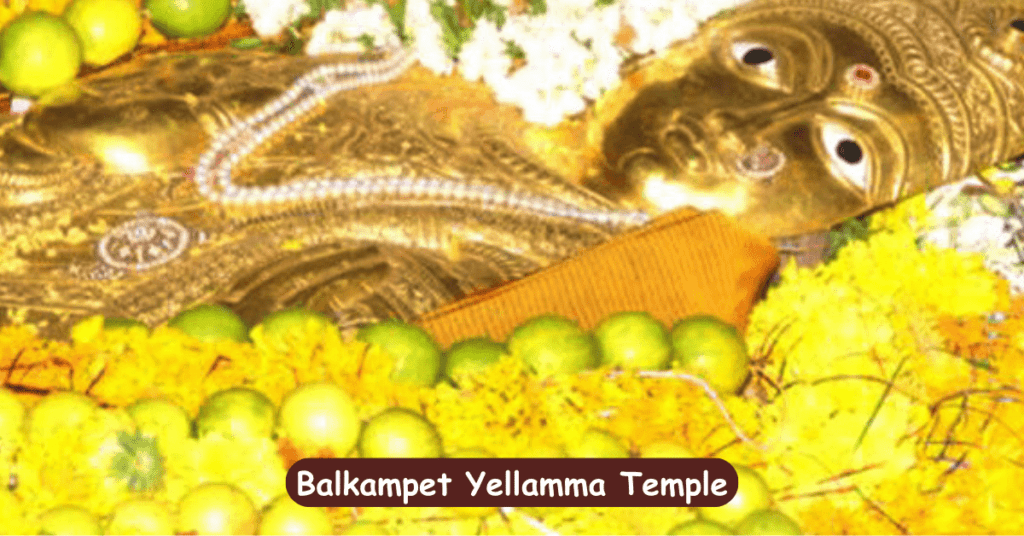
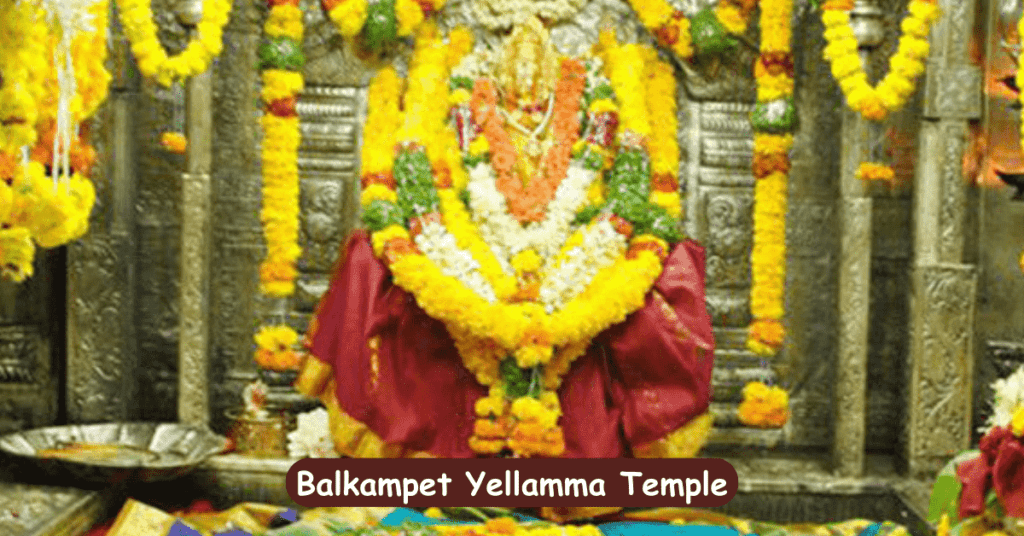
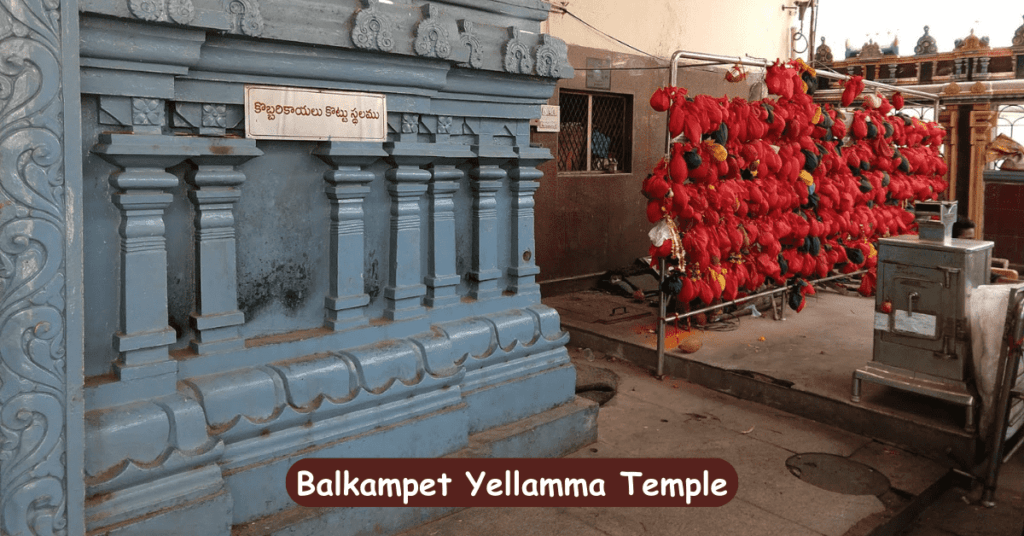
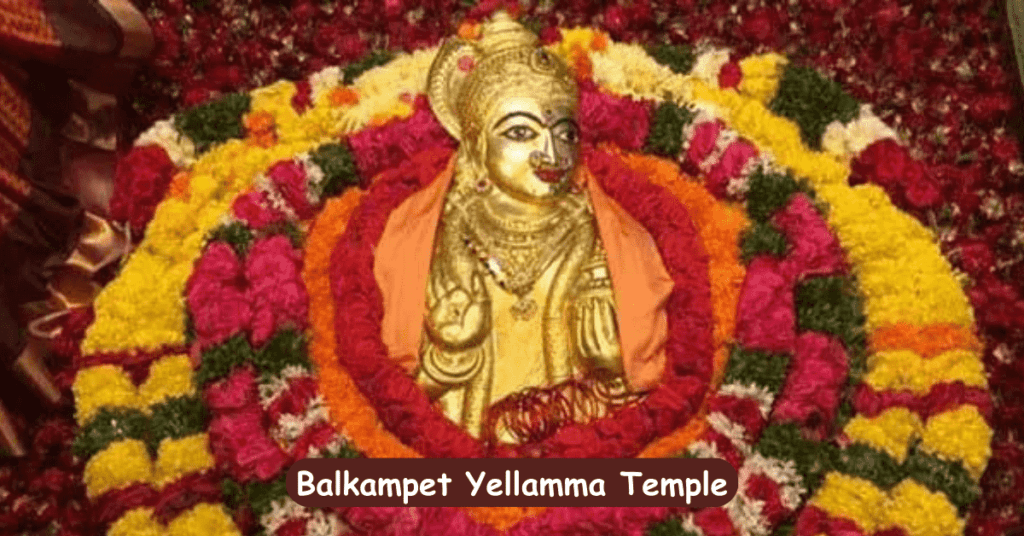
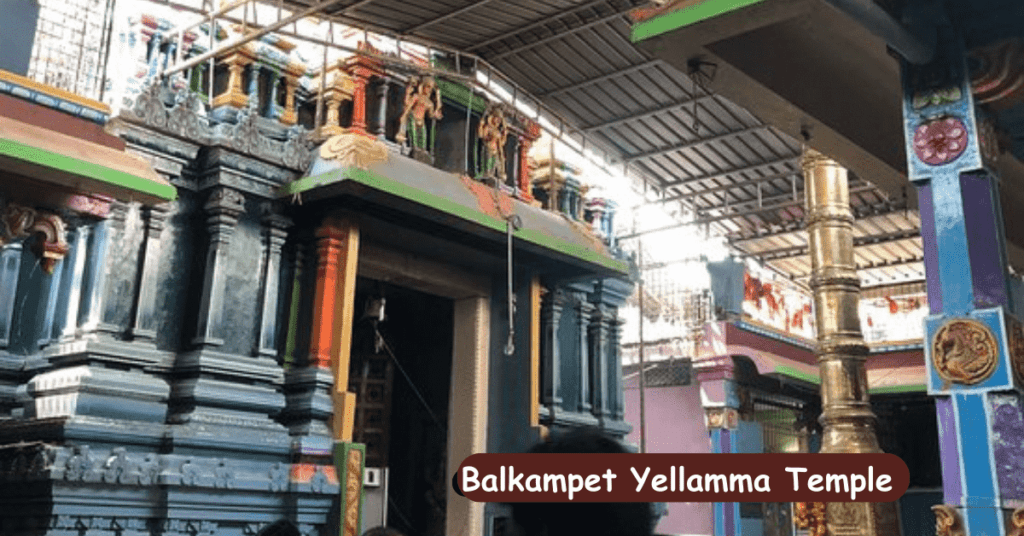

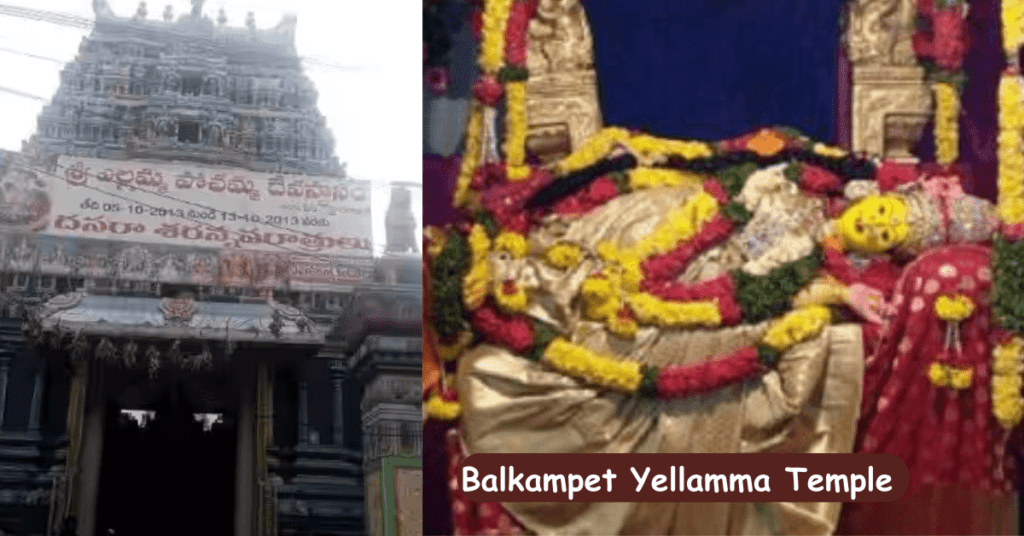


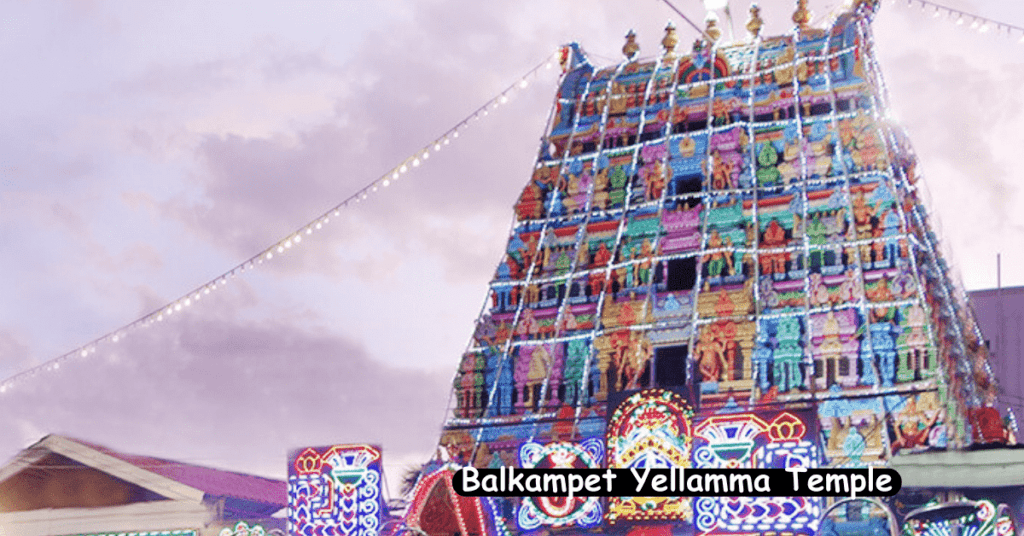
Balkampet Yellamma temple address and phone number
Sri Yellamma Pochamma Devasthanam,
H.No. /D.No. 7-1-277,
Balkampet Village,
Ameerpet Mandal,
Hyderabad – 500038
PIN – 500038,
India
phone number-
Temple LandLine:
040-23710696
Supdt. Phone Number
+91 99631 21467
How to reach the Balkampet Yellamma temple
To reach the Balkampet Yellamma Temple, located in Hyderabad, Telangana, India, you can follow these directions:
By Air:
R.G. I Airport in Hyderabad is the closest airport.
You can hire a taxi from the airport or take a pre-paid cab to the Balkampet Yellamma Temple. According to the traffic flow, the 40-kilometre trip should take 1.5 to 2 hours.
By Train:
The nearest central railway station is Secunderabad Junction.
From Secunderabad Junction, you can hire a taxi or an auto-rickshaw to reach Balkampet Yellamma Temple. The distance is around 8 kilometres and takes approximately 30 minutes, depending on traffic.
By Road:
Buses, taxis, or auto-rickshaws are viable local transportation alternatives if you travel from Hyderabad or the surrounding region.
You can provide the following address to your driver: Balkampet Yellamma Temple, Balkampet Road, Balkampet, Hyderabad, Telangana 500018, India.
Also, consider checking the temple’s timings in advance, as they may vary.
Conclusion
Balkampet Yellamma Temple, with its rich history, divine aura, and intriguing secrets, fascinates visitors from all walks of life. Exploring its mysteries, from the self-manifested idol to the hidden underground caves, offers a glimpse into the temple’s profound spirituality and cultural heritage. As you visit this sacred abode, be prepared to unravel the secrets that lie within and experience the enchantment and tranquillity that only Balkampet Yellamma Temple can offer.
